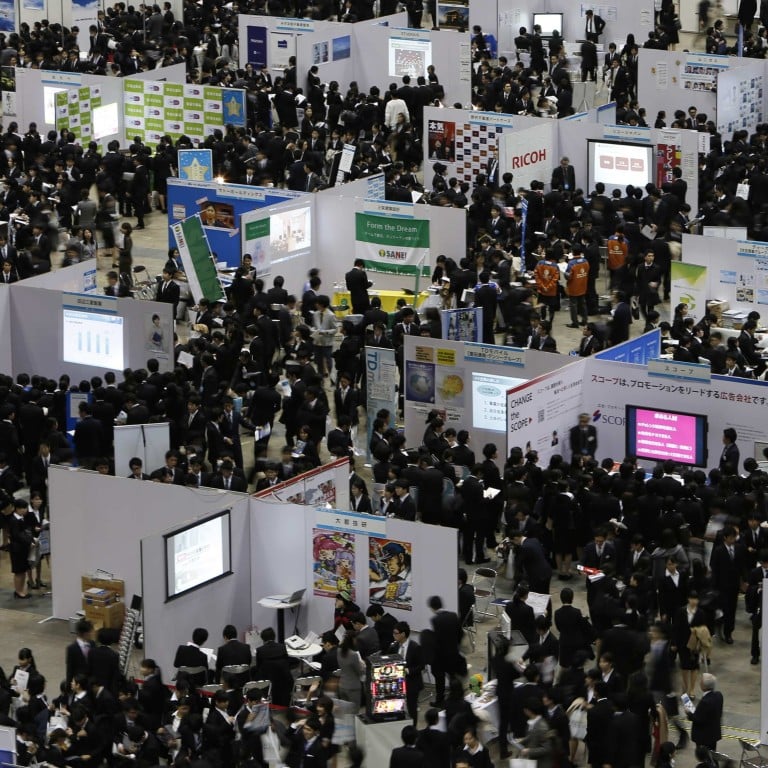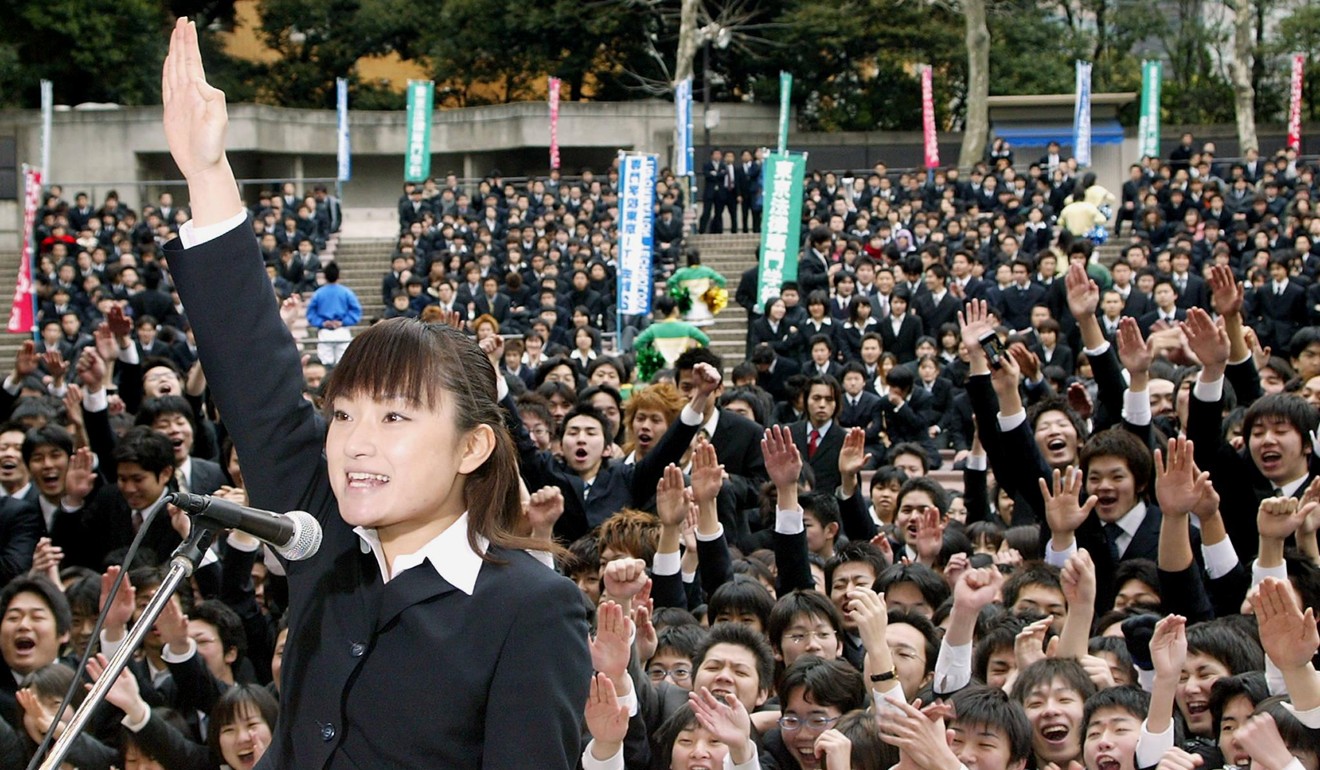
Do stressed millennials spell end for ‘shukatsu’, Japan’s notorious graduate recruitment process?
- An ageing population, dwindling workforce and changing attitudes to life-work balance force a rethink of Japan’s infamously tough job-hunting season
- So stressful is ‘shukatsu’ that many students say it has driven them to consider suicide
For Japan’s stressed-out students, it’s an extra pressure they could do without: the moment reality bites and they must spend half a year trying to convince the nation’s most respected corporations they are worthy of a job.
The demands of shukatsu, as Japan’s graduate recruitment season is known, are notoriously punishing.
Every year, beginning in March, hundreds of thousands of the country’s brightest young minds embark on the intense six-month process in which those seeking the most coveted positions will be expected to attend countless seminars, briefings, hiring sessions and job interviews if they are to succeed.
The stakes are high, with about eight in 10 graduates finding jobs this way last year, according to the education ministry.
It’s a very stressful time for students, because there’s a prevailing idea that there’s only one chance to get into a company
But so too are the pressures, with one in five students telling a study by the suicide prevention group Lifelink that the process had caused them to consider killing themselves.
“It’s a very stressful time for students, because there’s a prevailing idea that there’s only one chance to get into a company,” recalls Yumi Mizuno, a freelance translator based in Tokyo, of her own experience of shukatsu, which she and many of her peers dreaded.

A recent announcement by the Japan Business Federation that it would overhaul shukatsu for students graduating in 2021 has given hope to those who, like Mizuno, are critical of the system.
While the federation’s new guidelines are yet to be finalised, many say the revamp is not only long overdue, but inevitable in a rapidly ageing nation where a growing labour shortage and a generational shift in working attitudes have shifted the balance of power between employer and employee.
At the end of March, as the unemployment rate hit its lowest level in almost three decades, there were about two openings for every jobseeker in Tokyo. So difficult has it become to fill positions that the government has been forced into taking the politically damaging decision to import more foreign workers from abroad, particularly in sectors such as medical care and food and drink that are suffering shortages.
Japan’s open to foreign workers. Just don’t call them immigrants
Meanwhile, the emergence of the millennial generation has seen an increasing number of young Japanese like Mizuno, now 29, forgo what is traditionally the first step of the rat race, turning their backs on the promise of hefty pay packets to pursue careers that match their personal values.
Mizuno dropped out of shukatsu after realising that, try as she might, she could not put on a suit and a positive expression at the same time.
“Lots of students apply for more than 20 to 30 companies, but I think I applied for less than five,” she recalls. “I just wasn’t ready to start looking for jobs. Right now I have five to six years of working experience and I know what kind of positions I’m interested in and what I’m capable of, and how to filter jobs by their working environments, but at that time I didn’t know all about that. The [shukatsu] system deprived me of the opportunities to think about that and I was literally lost, I think.”
NEW APPROACH WANTED
Changing attitudes to graduate recruitment have left an opening for entrepreneur Akiko Naka, the founder of Tokyo-based job-seeking platform Wantedly, who likens current job-hunting methods to marrying someone you haven’t met.
Her desire to change this “leap before you look” job culture led her to found Wantedly – sometimes hailed as Japan’s answer to LinkedIn – in 2012. Instead of sharing job descriptions and salaries, Wantedly focuses on matching candidates and companies through shared values and interests. Employers can create profiles and blogs to showcase their company culture, so that applicants get a sense of what it might be like to work there.
It’s like attending school again – you get scored, and you have this pressure [to perform] … Goldman Sachs is a great company, but life is so short
“Users can apply for casual office visits to companies they are interested in,” Naka says. “Wantedly lets users ‘date’ the companies before they join them.
“One of our most important metrics is the number of visits,” she says. “Unfortunately we don’t track how long those new hires stay at their new companies after joining, but we have heard from our clients that hires through Wantedly tend to stay longer than the hires from other channels.”
Naka has first-hand experience of the pitfalls of the shukatsu system. Having graduated at the top of her class, Naka won a role at Goldman Sachs in Japan – an opportunity that was coveted by many, yet ultimately unsuited to her.
Why is Japan so obsessed with being on time?
“It was not what I expected. My experience was so different,” she recalls. “It’s like attending school again – you get scored, and you have this pressure [to perform] … Goldman Sachs is a great company, but life is so short.”
In traditional-minded Japan, and in many other conservative Asian countries, financial stability is valued over job satisfaction, she says.
“I have heard complaints from many people that they aren’t happy at their jobs, but they still stay at their companies.
“It’s nice to have a job, feel comfortable, and have good pay. I’ve heard these reasons from dozens of people around me who were unhappy.”

The success of Naka’s website suggests attitudes are shifting. Wantedly now has more than 2.6 million monthly active users and more than 30,000 companies including Sony, Nissan Motors, Apple, Uber and Dropbox on its books. The firm, listed in 2017, is valued at US$310 million and Naka plans to expand across Asia.
She says the website’s rise has been fuelled by the number of international start-ups now operating in Japan, a development that has forced traditional companies to adapt.
Japan reforms aim to fix long working hours, but will they do the opposite?
“Young start-ups have similar characteristics to Silicon Valley,” she says. “They’re far less hierarchical, have competitive salaries compared to large enterprises, and have relaxed dress codes.”
SCEPTICAL OF CHANGE
Despite the revamped system promised by the Japan Business Federation, and the emergence of new approaches to job seeking such as Naka’s, many remain sceptical that the Japanese business world is really ready to embrace change.
“The traditional recruitment process will not be eradicated immediately,” says Kumiko Kawashima, a sociology lecturer at Macquarie University in Australia. “The old and new recruitment systems will coexist in a hybrid fashion for some time. Rather than seeing the end of shukatsu, it’s probably more accurate to say shukatsu as a system is being reconceptualised.”
Karoshi crisis: why are Japanese working themselves to death?
It will take years before the ramifications of the new system become clear, and even then, any changes may only benefit the biggest employers, she says.
“Large domestic enterprises have welcomed the proposal [by the Japan Business Federation], because it will allow them to approach high-achieving students without the restrictions of standardised shukatsu,” Kawashima says. “This would help them compete with foreign-affiliated firms and venture companies, many of which are not Japan Business Federation members, and follow their own recruitment processes.

“However, small and medium-sized enterprises are worried this move will disadvantage them. If hiring occurs throughout the year, larger firms have the resources to invest in recruitment campaigns all year round, such as holding multiple information sessions. The new guidelines may worsen the disadvantages they already suffer.”
Yumiko Mura, a labour market specialist and the head of the OECD Tokyo Centre, agrees that with shukatsu “deeply embedded” into the traditional employment system it would be wrong to expect a quick change. “Large companies with rigid hiring practices might find it hard to adjust,” she says.
‘REPEATERS ARE ASSETS’
Still, even the largest corporation cannot cling to the past indefinitely.
“As Japan increasingly opens its labour market to foreign workers, women, older workers and other minority groups to address problems of an ageing society and the shrinking workforce, policymakers need to go beyond paying lip service to diversity and inclusion, and focus on creating workplaces where every young person can bring their strengths to collectively solve urgent problems we face in society,” Kawashima says.
In a sign that the times are indeed changing, the Japanese advertising company Tokyu Agency made waves recently for its claim in a recruitment advert that “repeaters are assets”. That went against the received wisdom of most major employers that repeaters – graduates who have undergone one or more years of shukatsu without securing a job – are failures best ignored.

For those like Yumi Mizuno, the translator who can still remember all too well her own experience of shukatsu, change can’t come soon enough.
“I think it’s natural that the shukatsu system will end because it only works when there is a high working population and when companies offer competitive pay, which has become something that’s very difficult for them to do,” she says.
“Many people still think it’s wiser to get into big companies through shukatsu, but more and more liberal young people don’t think like that any more.”

